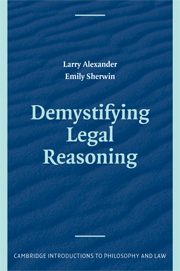Book contents
- Frontmatter
- Contents
- Introduction
- PART ONE Law and Its Function
- PART TWO Common-Law Reasoning: Deciding Cases When Prior Judicial Decisions Determine the Law
- II Ordinary Reason Applied to Law: Natural Reasoning and Deduction from Rules
- III The Mystification of Common-Law Reasoning
- IV Common-Law Practice
- PART THREE Reasoning from Canonical Legal Texts
- Epilogue: All or Nothing
- Selected Bibliography
- Index
- References
IV - Common-Law Practice
Published online by Cambridge University Press: 05 June 2012
- Frontmatter
- Contents
- Introduction
- PART ONE Law and Its Function
- PART TWO Common-Law Reasoning: Deciding Cases When Prior Judicial Decisions Determine the Law
- II Ordinary Reason Applied to Law: Natural Reasoning and Deduction from Rules
- III The Mystification of Common-Law Reasoning
- IV Common-Law Practice
- PART THREE Reasoning from Canonical Legal Texts
- Epilogue: All or Nothing
- Selected Bibliography
- Index
- References
Summary
In our analysis of the common law, we have argued that judges resolving legal disputes reason in the ways that all decision makers reason. They reason naturally, drawing moral and empirical conclusions through induction and the method of reflective equilibrium, and they reason deductively from authoritative rules. Natural reasoning is unconstrained by law; deductive reasoning is constrained by legal rules that preempt natural reasoning. Other methods of decision making popularly attributed to judges, including analogical reasoning from case to case and reasoning from legal principles, are illusory. Judges may appear to do these things, but analogies and legal principles impose no actual constraint on judicial reasoning. The outcome of purportedly analogical processes rests in fact on natural or deductive reasoning.
We have also suggested that the common law will be most effective, both in correctly resolving particular disputes and in settling future controversies, if current judges treat rules established by prior judges as binding in a preemptive sense. This model of judicial decision making, which we have called the rule model, entails that judges have rule-making authority. In Chapter 2, we addressed some of the theoretical questions that arise when judges act as rule makers, including the scope of their rule-making authority, preconditions for establishment of binding precedent rules, and overruling of precedent rules. In the present chapter, we consider some practical objections to the rule model, both as a prescription for judicial decision making and as a description of judicial practice.
- Type
- Chapter
- Information
- Demystifying Legal Reasoning , pp. 104 - 128Publisher: Cambridge University PressPrint publication year: 2008

